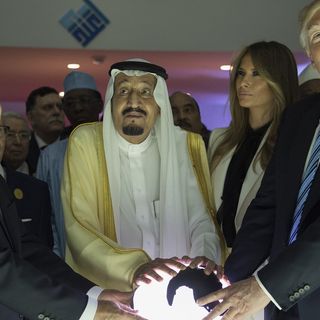1. Kavanaugh Sworn In
Associate Justice Brett Kavanaugh will take his seat on the Supreme Court this week. What started out as a relatively conventional confirmation battle in the style of President Trump’s first successful pick – Neil Gorsuch to take the Scalia seat – became the ugliest, most divisive, bitter, partisan Senate review since Clarence Thomas in 1991.
Almost everyone who touched it – Trump, Kavanaugh, Grassley, Hatch, McConnell, Feinstein, Booker – was dirtied. Dr Christine Blasey Ford, who told her story of a sexual assault, was pilloried, mocked and brutalised. The Senate was degraded, its offices overrun with protestors, and senators requiring police protection to go the floor. This has been a savage exercise in a democracy riven with hyper-partisanship.
2. Trump had his best week of the year
American foreign policy after the midterms

Consider this: Kavanaugh has been confirmed, the United States has the best employment numbers in 50 years, there's a new trade agreement with Canada and Mexico, a promise kept to cement a conservative majority on the Supreme Court, a booming economy delivering jobs and rising wages, and a huge trade deal to carry "America First" to other trade fights with America’s allies. There's been silence over the past fortnight from Special Counsel Robert Mueller and his grand jury. A “failing New York Times” expose of the Trump family business structures did not force disclosure of Trump’s tax returns nor gain much traction beyond the day's news cycle. The vice president is on fear and loathing patrol of China.
In short, one month before the midterm elections, a president is at a new peak of command across domestic and foreign policy.
3. Will Trump get his promised “Red Wave” and keep control of Congress?
With this record, Trump’s approval numbers should be in the mid-50s – but they languish 10 points or more below that. And this is where views of Trump as a leader continue to shape voter judgments. The country should feel good about itself, but it doesn’t. The Kavnaugh fight exemplified, indeed embodied, a country more divided than at any time since Vietnam. Over the past three decades, where a president has lost at least house of Congress in the midterms – the Gingrich Republican landslide against Clinton in 1992, George W. Bush losing both the House and Senate in 2006, Obama upended by the Tea Party in 2010 – what was evident was anger at the sitting president’s perceived failures. For Clinton it was over energy prices and a slow economic recovery; Bush over the Iraq war; Obama over healthcare.
Explainer: Midterm election seats in play

The anger against Trump today is not over the economy, but over issues tearing at the fabric of the American polity: treatment of women, race, immigration, economic inequality, access to healthcare, corruption and chaos inside the White House. All in the context of a president who is viewed by many as unfit for office.
So how will the Kavanaugh fight play out?
- Democratic senators in Trump red states who voted "No" – Heitkamp in North Dakota, Donnelly in Indiana, McCaskill in Missouri, Tester in Montana – could pay dearly for opposing Kavanaugh. The Democrats need a net gain of two seats to take control of the Senate. Four vulnerable Democrats in states Trump carried in 2016 – and six more under challenge – make that much harder.
- But in House races, with more than 40 Republicans retiring, including the Speaker, many in suburban districts where anger among women and independent voters against Trump is quite high, and with women candidates surging – all now buttressed by the bitter aftermath of the Kavanaugh confirmation – and with a swing of only 23 seats needed for the Democrats to take the chamber, Democrats are today well-positioned to do that.
As it looks today, post-Kavanaugh and one month out, Democrats take the House; Republicans keep the Senate.
4. This week’s cautionary tale
In 2013, Democrats frustrated at their inability to break Republican filibusters of Obama’s judicial appointments below the level of the Supreme Court triggered the “nuclear option“ – eliminating the 60-vote requirement for those judges. Four years later, in a 52-48 Republican Senate, Trump could not get his first Supreme Court appointment – Neil Gorsuch – through without eliminating the filibuster for the Supreme Court as well. Last year, the Republicans duly changed the Senate’s filibuster rules, and Gorsuch was confirmed 54-45. Kavanaugh was 50-48. Over the last 47 years and 19 Supreme Court nominees – since Nixon’s time – only two other judges received less than 60 votes. Even Scalia (98-0) and “Notorious RBG” (96-3) vaulted onto the Court with ease.
The supermajority requirement worked to protect and enhance the reputation of the highest court by imposing a political discipline on presidents to nominate, and the Senate to confirm, the most able and mainstream jurists who could command true bipartisan support. Eliminating the super majority for the Supreme Court has resulted in the utter politicisation of these most important judicial appointments. This is hurting the country, and there is no prospect what has been lost can be recovered.






